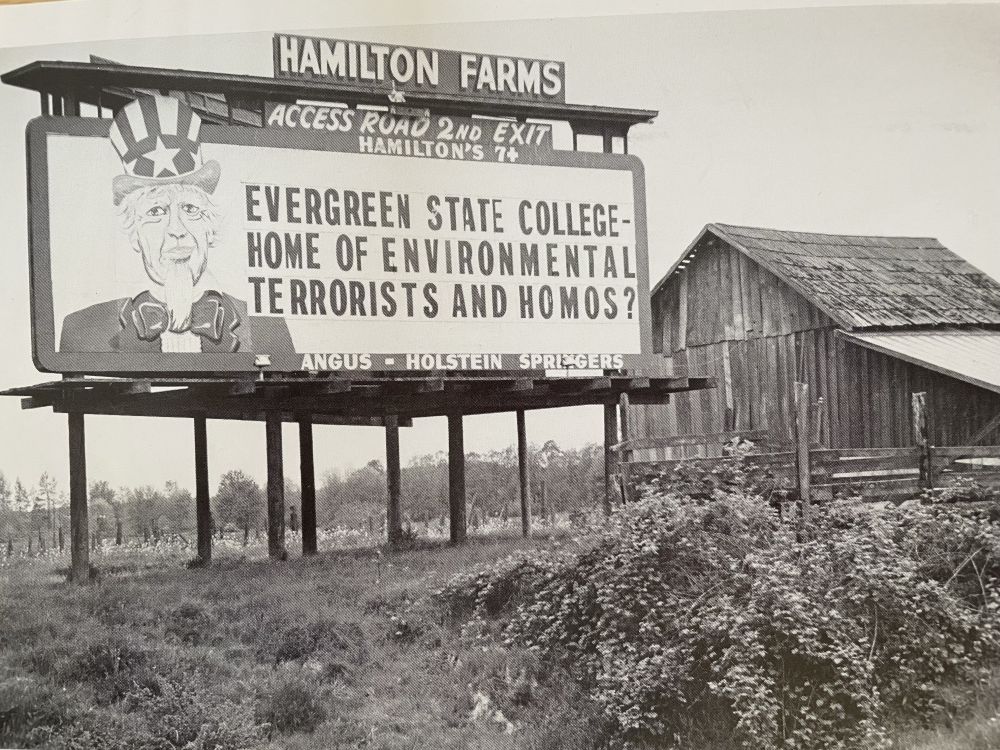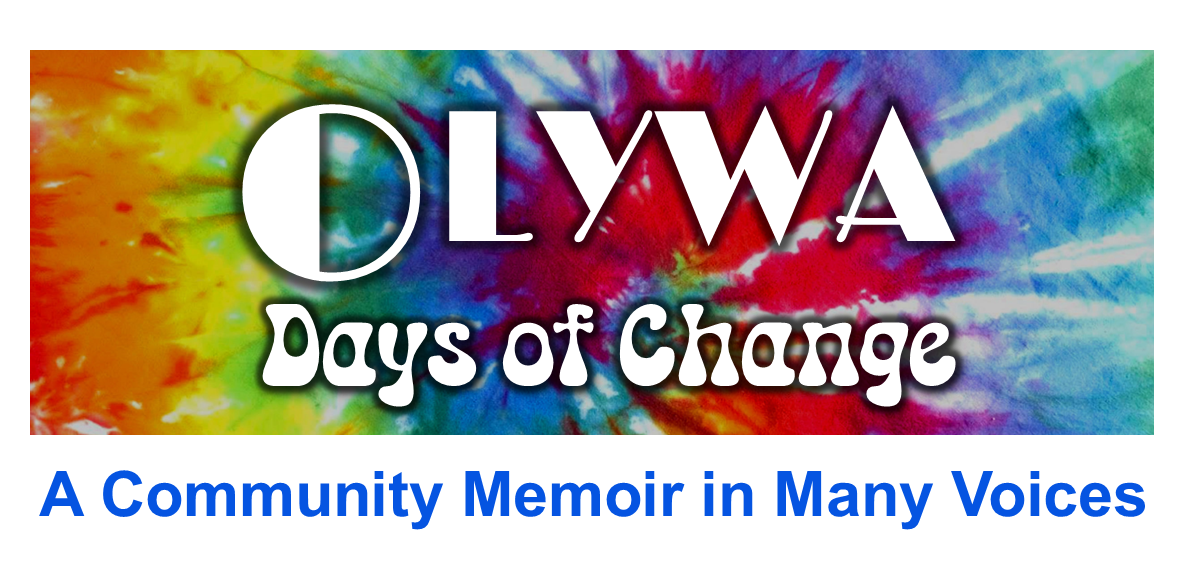VIGNETTES
Of Eco-Terrorists and Homos–Biography of a Photo
An interview with Felicity Scott Hutsell
By Anna Schlecht
Few pictures captured the rift between local conservatives and the hippie invasion attracted by Evergreen more than a photo taken by Felicity Scott Hutsell in 1987.

Felicity told me about that day. “A friend of mine was driving south on I-5 and saw this hilarious billboard on the side of the road. He told me about it when he got back to town. We were both students at Evergreen and we thought it was a hoot. As soon as he told me about it, I decided to drive down myself to take a picture,” Felicity said.
This was the infamous Hamilton Farms billboard, located next to the freeway in rural Lewis County, renowned for its image of Uncle Sam alongside right-wing slogans. On this particular day, the message was, “Evergreen State College – Home of Environmental Terrorists and Homos?” Once Felicity and her friend stopped laughing, she knew this was an iconic photo that she needed to take.
Originally from Spokane, Felicity first moved to Seattle and then moved to Olympia in 1983 to attend Evergreen. This was an easy move because her brother David Scott was already there, and she was drawn to Evergreen as a non-traditional school. “There was a saying back then, ‘Question authority,’ and it seemed that’s what Evergreen was all about. I liked that,” she said.
For many students, questioning authority also meant challenging the entire status quo, and for some it meant becoming activists. All that questioning and activism was unnerving to the surrounding community, where 1950s conformity was still the social norm 30 years later. This Lewis County billboard articulated the stereotypes of Evergreen held by many conservatives.
Felicity had high hopes for her photo. “I planned to submit it to the Cooper Point Journal (CPJ), because I thought all the other students would see the irony and get a big laugh out of it. But when I went into the CPJ office, I was disappointed to learn they already had a photo of the billboard and had already run a story with it from a political angle. I thought that approach totally missed the irony—it was really funny, and I knew that the humor would speak to the entire student body.”
Undaunted, Felicity moved on to plan B. She decided to create a postcard and found a printer. The card featured the image on the front with a caption on the back that clearly explained the context:
The Evergreen State College located in Olympia Washington, enjoys a little roadside notoriety. Here, a postulating agrarian neighbor does his part to cultivate community support for “Greeners.”
Next, she figured out how to sell it. Felicity recalled that, “I made a bunch of postcards and had the image copyrighted. Then I went around town to find places to sell it, like the Spar and a couple other little shops. It was selling pretty well, so I thought: why not ask the Evergreen Bookstore on campus to carry it? I was not expecting the response I got from the manager, he was all over it. He told me it was an iconic shot and that he was sure that the postcard would sell as long as there were Greeners in the world.”
And for the next 30 years the post card did sell quite well. Especially around graduation time when students and their families gathered up mementos of their college days in the Pacific Northwest. However, in recent years things changed, and the joke was no longer as relevant.
Wistfully, Felicity shared that, “About five years ago, the Evergreen Bookstore stopped selling the postcard.” For whatever reasons, this light-hearted postcard from the past no longer resonated with the student body.
While the world has changed and political divisions seem deeper than ever, there are still plenty of Greeners who get the joke and delight in the irony. Many of us still laugh aloud at the ridiculous fears and stereotypes that inspired a rural billboard in Lewis County in 1987. Since its founding, Evergreen has churned out quite a few radicals, or folks intent on making fundamental changes to our social and political systems. A larger percentage of students went on to become reformers, intent on working within the system to make their communities more welcoming places for all. They work as teachers, business owners, government employees, artists, health care providers, and environmental consultants, each taking what they learned at Evergreen to make their communities better places to live, including for the residents of Lewis County. And hopefully, we all still have a sense of humor.
We encourage readers to use the form below to make comments and suggestions. Disclaimer
